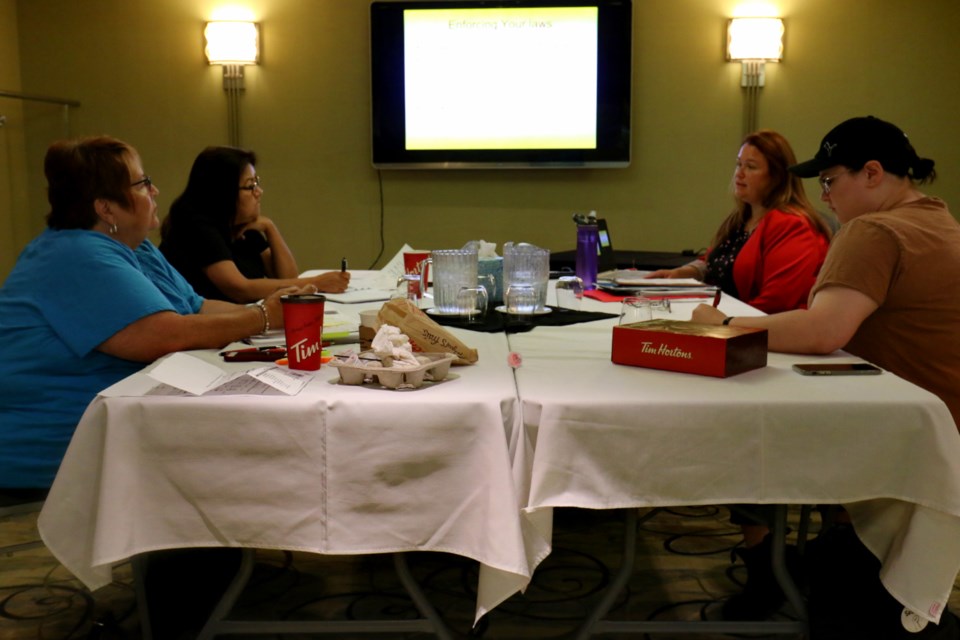The Anishinabek Nation - a political organization representing 40 First Nations and roughly 60,000 citizens throughout Ontario - hosted the first of three information sessions surrounding First Nation constitution in Sault Ste. Marie Tuesday.
Crystal Stevens, legal counsel for the Anishinabek Nation, says that the information sessions have put in place in order to help First Nations while they draft their own constitutions.
“Each First Nation that has their own constitution, it’s their supreme law for their First Nation,” Stevens said. “All their other laws or regulations or policies will all be in line with their constitution.”
Of the 40 First Nations under the Anishinabek Nation umbrella, 29 of those have either drafted their own constitution, or have already ratified and implemented one.
In a document published by the Anishinabek Nation entitled, ‘What is a constitution?’, The Union of Ontario Indians and the Anishinabek Nation states that a constitution sets out basic principles and regulates government:
“A constitution is the fundamental law of a nation, which may be written or unwritten. Among other things, a constitution creates, empowers and regulates government, it sets out the basic principles government must conform to and the rights of the citizens of the nation in the context of establishing the extent and manner of the exercise of sovereign powers.”
According to the Anishinabek Nation website, a total of eight First Nations, so far, have ratified constitutions that have already been implemented:
- Aamjiwnaang First Nation
- Atikameksheng Anishnawbek
- Biigtigong Nishnaabeg
- Mississauga #8 First Nation
- Nipissing First Nation
- Pic Mobert First Nation
- Sheshegwaning First Nation
- Wikwemikong Unceded Indian Reserve
Kathleen Naponse, who works for the lands and duty to consult department at Thessalon First Nation, says that the small First Nation situated on the north shore of Lake Huron is still in the midst of working on the draft of its own constitution.
The initial draft for the Thessalon First Nation constitution was completed about seven or eight months ago.
Once that constitution is ratified, the First Nation could possibly sign on to be a part of an even larger constitutional framework - the Anishinaabe Chi-Naaknigewin - that was ratified and implemented by the Anishinabek Nation in the summer of 2012.
“We have not signed the Chi-Naaknigewin constitution, because Thessalon believes in having its own constitution first, and then signing on after that, once the community has voted on it,” Naponse said.
Each First Nation, Stevens says, is very diverse, with its own important fundamental values.
Usually when a First Nation enters into the process of developing its own constitution, a committee is formed leading up to the eventual creation of a constitution.
It’s then submitted to chief and council for approval before going through a community consultation process, where membership can weigh in.
Amendments are usually suggested by chief, council and band membership before going to a ratification vote.
“A constitution is a solid foundation for First Nations to move ahead in self-government and in
nation-building activities,” the material reads. “Your constitution will be specific to your community.”
“It should address your community’s sense of itself, how you are governed, how the membership has input into governance, key positions of your government and your sovereign powers.”
Stevens says that many First Nations are still in the development stages of creating their own community-specific constitutions.
“Their constitutions lay out their most important principles or fundamental values within their community,” Stevens said. “It helps them decisions, it also sets out their process for law making.”
The next constitution information sessions take place Aug. 23 in Thunder Bay, Ontario and in Vaughn, Ontario Aug. 28.
